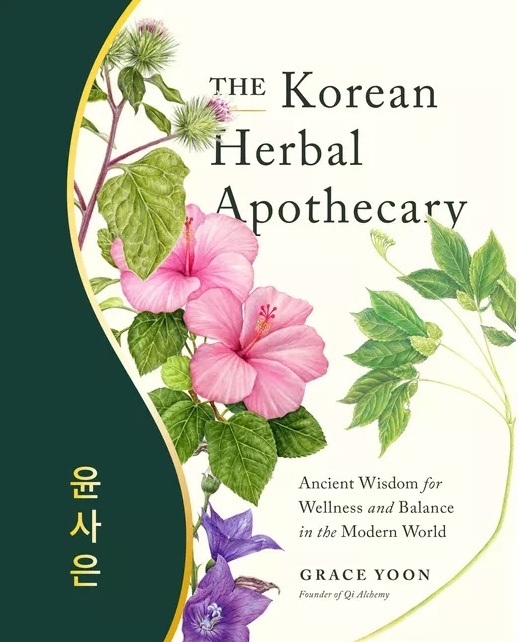
By Grace Yoon
Fair Winds Press, 2023
208 pages, paperback, $24.99
“The Korean Herbal Apothecary” by Grace Yoon is a concise and powerful exploration of Korean herbal medicine, blending ancient practices with modern well-being. Authored with a clear passion for herbal wisdom, personal connection and stories from Yoon’s family, and Korean proverbs, poetry and folklore, this book is a valuable resource for anyone curious about natural remedies no matter their own ancestral lineage.
To begin, the book emphasizes and explains the importance of our vital life force, or “Qi,” and where it comes from. One aspect that contributes to our Qi is the foods we eat, and this book aims to support and nurture your Qi with many easy-to-follow recipes for nourishing foods, from savory rice porridge to acorn jelly salad. The essentials of the Korean apothecary are not just herbs but include rice and a variety of flours as well. Vinegar is an important staple and the author presents a tale of the founding fathers of eastern philosophy — Confucius, Buddha and Lao Tzu — tasting vinegar and their different perspectives on its flavor. Yoon also shares a simple recipe for mugwort persimmon vinegar that is sure to bring a unique flavor to one’s cooking. Mugwort not only plays an important role in the Korean pantry but also in Korean rituals and folklore. Yoon shares a tale of a bear and tiger who were told to eat only mugwort and garlic for 100 days and avoid the sunlight if they wanted to become human. You will have to read the book to hear how the tale ends!
“The Korean Herbal Apothecary” is divided into chapters with several dedicated to specific seasons, making it a wonderful resource to revisit seasonally to know what foods, herbs and practices can best support the body, mind and spirit at different times of the year.
Herbal monographs are accompanied by simple color drawings, and many are also paired with a personal story showing the depth of the author’s connection to these plants. The monographs explain the medicinal compounds that have various effects on the body while breaking down complex herbal concepts into simple terms, making the book suitable for both beginning and seasoned herbalists.
Herbalists who don’t live in Asia may find themselves asking if they will have access to the herbs mentioned in this book and I assure you, yes! Many of the plants mentioned are now found the world over, and people might even know them as common weeds. Additionally, ones that seem rare can be cultivated in a variety of locations or found at an Asian grocery store. For herbalists or general plant enthusiasts who may already know some of the plants, Yoon’s book highlights their cultural significance and other ways that they have been used or beloved in Korean life. “The Korean Herbal Apothecary” stands out as an herbal guide for anyone wanting to broaden their awareness of how herbs can be incorporated and appreciated into their own daily life.
Denise DeSpirito, Of the Spirit Herbals, Rockland, Maine
